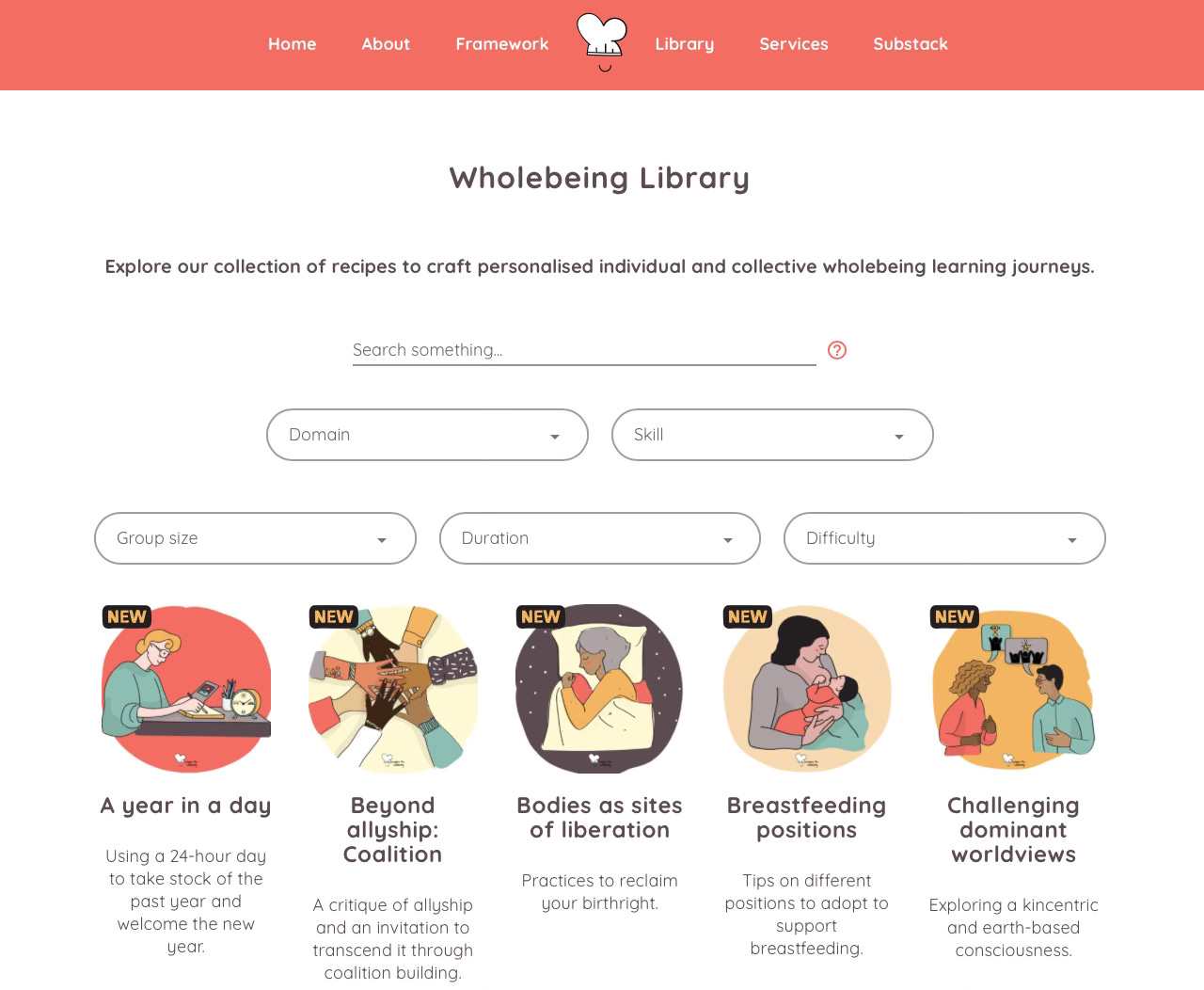Wholebeing: Learnable skills for changemakers
Hone wholebeing through focused intention and deliberate practice.
Refresher ⏮️
The previous post explained the nuances behind our concept of wholebeing, so if you missed it, check it out here.
Wholebeing as a skill
At Recipes for Wellbeing, we embrace wholebeing as a set of learnable competencies and actionable practices for individual, community, and planetary flourishing. This perspective creates the possibility for changemakers and their organisations to hone wholebeing through focused intention and deliberate practice.
Understanding wholebeing as a skill is transformative, radical even.
Skills such as reciprocity – fostering relationships characterised by mutual care and support; – non-extracting – avoiding the difficult removal of precious and limited resources; – and conflict transformation – engaging tension and disagreement to move towards something positive; are more than habits; they are foundational to enhancing collective wellbeing.
The impact of this approach deepens when you recognise that the journey toward wholebeing is most effective when it is a shared endeavour. Whether applied within small communities or larger structures, our Wholebeing Framework maintains a nuanced and adaptive approach to Community Wholebeing.
The Wholebeing Framework
Our newly developed Wholebeing Framework is a liberatory learning structure that outlines 12 Wholebeing Domains, encompassing a total of 170 Wholebeing Skills. This framework is designed to guide individual changemakers and their organisations in cultivating a comprehensive approach to individual, community, and planetary wholebeing.

🌟 Accomplishments
The ability to channel your motivation and talents to strive for wholebeing. It involves leaning into discomfort and persevering through resistance. This includes skills such as accountability and planning.
🌟 Awareness
The ability to stay present with each moment as it is, without judgement. It involves moving beyond autopilot to be present with the here and now. This includes skills such as mindfulness and reflection.
🌟 Bioempathy
The ability to return to our innate connection with Nature and learn to coexist and flourish with the natural world, recognising that we are an integral part of it. This includes skills such as consciously engaging with the more-than-human world.
🌟 Community
The ability to extend beyond individual self-care towards fostering community care. It involves placing the onus of action on the community versus the individual. This includes skills such as multiperspectivity and equity.
🌟 Digital Consciousness
The ability to engage with digital spaces and algorithms consciously and meaningfully. It involves nurturing Wholebeing and communities in virtual environments. This includes skills such as digital agency and digital boundaries.
🌟 Discomfortability
The ability to be at ease with discomfort and working through resistance instead of fighting it. It involves acknowledging the full range of human experience, both the ‘good’ and the ‘bad’. This includes skills such as agency and self-regulation.
🌟 Liberatory Learning
The ability to deepen understanding to free yourself and others from oppressive systems. It involves constant unlearning and relearning. This includes skills such as liberation and self-directed learning.
🌟 Meaning
The ability to connect and contribute to something bigger than yourself. It involves knowing that your life matters and is worth living and taking responsibility for your efforts. This includes skills such as fulfilment and having a purpose in life.
🌟 Positive Emotion
The ability to see possibilities and take in the goodness. It involves becoming a possibilist for wholebeing. This includes skills such as gratitude and abundance.
🌟 Radical Care
The ability to care radically. It involves building relationships and communities through mutual understanding and shared healing. This includes skills related to tending to ourselves and others with deep compassion.
🌟 Rest
The ability to value rest and renewal as means to liberation. It involves reframing yourself as a human being, not just a human doing. This includes skills such as relaxation and slowing down.
🌟 Ritualising
The ability to cultivate Wholebeing through daily and seasonal rituals. It involves reclaiming the sacredness in your life. This includes skills such as journaling and embodiment.
Explore the Wholebeing Framework
Our open-source library allows you to dive deeper into each wholebeing domain, explore the associated wholebeing skills, and access practical recipes to integrate these principles into your daily work and life.
We encourage you to bookmark this page and return to it regularly as you progress on your wholebeing journey. We hope it serves as a helpful guide to cultivate the skills that resonate most with you, your organisation, and your community.
Teaser 👀
The next post will introduce the skill of ordinariness. In the meantime, as you engage with our wholebeing practices, share your commitments, insights, and experiences on your #WholebeingJourney in the comments section below.
Big hugs,
Alessia, Greta, and Tariq



